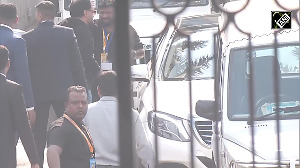At its Jaipur meeting, the BJP will focus on this year's assembly elections in Gujarat and Himachal Pradesh while the Congress's Chintan Shivir in Udaipur will discuss how it can resurrect itself.
Prakash Bhandari reports from Jaipur.

Though Rajasthan is reeling under an intense heat wave, the Bharatiya Janata Party and Congress have chosen Jaipur and Udaipur respectively for introspection sessions.
The Congress is holding a three-day Sankalp Shivir from May 13-15. This will include a Chintan Shivir which will discuss the poll debacles in Punjab, Uttarakhand, Uttar Pradesh, Manipur and Goa.
The BJP will hold its national executive meeting in the state on May 20-21.
There is a reason why both the Congress and BJP have chosen to meet in Rajasthan.
Holding strategic discussions in a neighbouring state sends a strong message to poll-bound Gujarat which is readying for its Vidhan Sabha election in December or earlier.
While the BJP is currently in power in Prime Minister Narendra Damodardas Modi's home state, it confronts strong challenges from the Congress and Aam Aadmi Party.
Congress interim President Sonia Gandhi has formed several committees that will present reports at the Udaipur convention. The party's deliberations will focus on how it can rejuvenate itself to combat future challenges.
The BJP, on the other hand, will focus on the organisational strategies to be adopted for the forthcoming assembly elections in Gujarat and Himachal Pradesh, a state where it is also in power and again confronts challenges from AAP and the Congress.
The BJP national executive meeting will be attended by national office bearers, state general secretary in-charges and co-in-charges, state presidents and state general secretaries (at the organisation level).
A communication from BJP national General Secretary Arun Singh has asked state presidents and general secretaries (organisation) to report on activities undertaken by the party in their respective states.
Modi will not be physically present at the meeting, but will address party leaders via video conferencing.
The meeting, which will be presided over by BJP national President Jagat Prakash Nadda, will focus on how to inform the country about the government's achievements, on strengthening the organisation in various states and on creating a strong organisational base in the southern states.
Party leaders feel the BJP swept the recent polls in Uttar Pradesh and Uttarakhand in the north, Manipur in the north-east and Goa in the west because of a strong organisation.
They also believe the party failed in Punjab as its organisational base was weak. This failure in Punjab, they believe, paved the way for the Aam Aadmi Party's emphatic emergence in the state.
The BJP, which had earlier allied with the Shiromani Akali Dal, benefited from the latter's organisational base. But once they parted ways, the BJP lost the gains it had made and will now have to rebuild its presence in the state from scratch.
Jammu and Kashmir will also feature in a big way in the ruling party's discussion.
The abolition of Article 370 in the former state has helped BJP in its recent election campaigns.
The party has also been highlighting the sufferings of Kashmiri Hindus and demanding their rehabilitation under the new regime, an issue that they will discuss at the Jaipur meeting.
Under the new format suggested by the Delimitation Committee, the BJP plans to get two Kashmiri Pandits nominated to the state assembly.
Another issue that will be discussed is a political alliance in the Union Territory, with special focus on a politician from the Jammu region becoming chief minister.
The saffron party will also discuss ways to improve its presence in Tamil Nadu, Telangana, Andhra Pradesh and Kerala; Karnataka is the only southern state where the BJP has a government.
They will look at forging alliances with regional parties, particularly in Telangana and Andhra Pradesh, where the Telugu Desam is lying low and the Congress is on a downward path.
Strong strategic issues could help the BJP make in these two states.
The BJP knows that unless it musters electoral support in the south, it will continue -- despite its successes -- to fall short of being a truly representative pan-India political outfit.
In Rajasthan, the Congress is hopeful of retaining power; it believes that, under Chief Minister Ashok Gehlot's leadership, it has won the heart of the state's people by its multiple welfare schemes, particularly those looking at health.
The BJP's decision to hold the meeting in Congress-ruled Rajasthan is politically significant as the party has been seeking to corner the Gehlot government over a host of issues, including the recent incidents of communal violence.
However, the BJP in Rajasthan is faction-ridden and there are too many aspirants for the chief minister's chair.
Topping the list is Gehlot's arch-rival, Union Minister Gajendra Singh Shekhawat; both leaders belong to Jodhpur.
This problem cropped up after the BJP leadership in Delhi sidelined Vasundhara Raje, who continues to remain the party's most accepted leader in the state.
While Raje commands the support of 56 of the state's 74 BJP MLAs, and 17 of its 25 MPs, she is on the wrong side of both Modi and Shah.
Other BJP leaders in the race for Rajasthan's chief ministership -- the state goes to the polls in December 2023 -- are Lok Sabha Speaker Om Birla, leader of the Opposition in the state assembly Gulab Chand Kataria, deputy leader of the Opposition Rajendra Singh Rathore and state BJP President Satish Poonia, MLA.
Kataria -- who remains, after Scindia, the state's most popular BJP leader -- could have been an ideal choice to be the BJP's chief ministerial nominee, but, as he is 78, he is not favoured by the party's central leadership.
The Jaipur meeting will mark the BJP's first physical conclave after the pandemic.
At the Congress's Chintan Shivir, which many political watchers are already dubbing an eyewash, Rahul Gandhi may be offered an even bigger role in the party.
Feature Presentation: Aslam Hunani/Rediff.com










